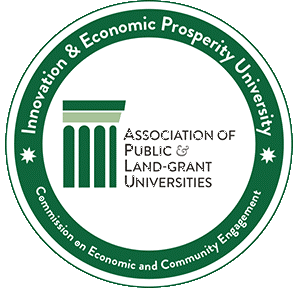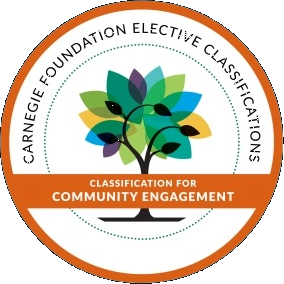The Office of University Outreach and Engagement participates in a number of community-based networks across the state. Each network listed here has its own structure, governance, and criteria for participation. If you are interested in finding out more about one of these networks, including potential opportunities for participation, please use the contact information provided. The network contact, as well as the contact of an affiliated participant from University Outreach and Engagement (UOE), has been provided.
EDA University Center for Regional Economic Innovation (REI)
The REI Center at the MSU Center for Community and Economic Development is building a new economic development ecosystem, leveraging higher education assets to support the co-creation, co-application, and dissemination of innovative economic development strategies that promise to yield high-growth entrepreneurship, job creation, and economic innovation throughout the state of Michigan.
UOE Contact: Rex LaMore Director, MSU Center for Community and Economic Development
Big Brothers Big Sisters Michigan Capital Region
Big Brothers Big Sisters matches at-risk children with adult mentors and works to advance the interests of area children and families, with dozens of campus and community partners.
Contact: Rich Howard Executive Director, Big Brothers Big Sisters Michigan Capital Region
UOE Contact: Renee Miller Zientek Executive Director, MSU Center for Community Engaged Learning
Ingham Great Start Coalition
Ingham Great Start is a coalition of human service agencies, families and other partners working together to ensure every child from birth to eight in Ingham County has access to a universal, comprehensive and collaborative system of community-based early childhood programs, services and supports.
Contact: Michelle Nicholson Coordinator, Great Start Coalition
UOE Contact: Rex LaMore Director, MSU Center for Community and Economic Development
Healthy Flint Research Coordinating Center
The Healthy Flint Research Coordinating Center (HFRCC) is a partnership between Flint community-based organizations, Michigan State University, University of Michigan-Flint, and University of Michigan to help address the public health challenges in Flint, including a focus on the economic, environmental, behavioral, and physical health of Flint residents.
The HFRCC will serve as a central coordinating center for research where individual researchers and community organizations can connect and partner through the center to achieve their goals.
UOE Contact: Robert Brown
Associate Director, MSU Center for Community and Economic Development
Neighborhoods Without Borders (Flint)
Neighborhoods Without Borders (NWB) is a community-based network that uses an asset-based approach to work on critical issues that improve the overall quality of life in Flint neighborhoods. Facilitated by a core team that includes Center for Community and Economic Development Flint staff members and grassroots organizations, NWB brings people from all sectors together using Strategic Doing, a process which enables people to form agile collaborations, take quick action toward measurable outcomes, and make adjustments along the way.
UOE Contact: Robert Brown
Associate Director, MSU Center for Community and Economic Development
Tribal Early Childhood Research Center (TRC)
The TRC is composed of a broad network of independent community partners and researchers working collaboratively to address research, practice, and policy issues relevant for the healthy development of young American Indian/Alaska Native children.
Also see: Wiba Anung (Early Star) Partnership, American Indian/Alaska Native Head Start Research Center; Inter-Tribal Council of Michigan.
Contact: Ann Cameron
Director, Inter-Tribal Council Head Start
UOE Contact: Jessica Barnes-Najor
Director for Community Partnerships, Office for Public Engagement and Scholarship
Urban Learning and Leadership Collaborative (Detroit)
A collaboration of several universities and community organizations in Detroit, focused on fostering new activity in the 100 blocks that make up the Hope Village area in Detroit. They partner with many university and community organizations.
UOE Contact: Jena Baker-Calloway
Director, Michigan State University Detroit Center
Detroit Area Pre-College Engineering Program (DAPCEP)
DAPCEP is a nonprofit organization that integrates the talents and resources of parents, community groups, area schools, industry, colleges, and universities to provide historically underrepresented youth with innovative educational programming in science, technology, engineering, mathematics, and medicine.
Contact: Michelle Reaves
Executive Director, DAPCEP
UOE Contact: Jena Baker-Calloway
Director, Michigan State University Detroit Center









